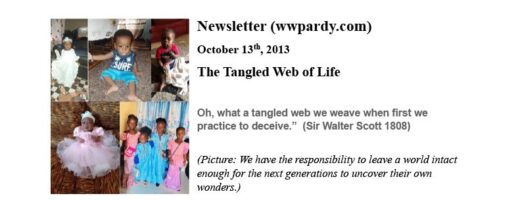As the second decade of the 21st century begins a universal mistrust appears to be the greatest challenge facing humankind. A global social deficit, it is not limited to any political philosophy or religious belief. Indeed, it appears to be approaching endemic proportions, transcending all levels of governments, religions and institutions; despite their assertions of individual honourable moral intentions.
Much of this mistrust has been driven by a general diminishment of moral values, an approach to life built on materialism and increasing cynicism. The current financial crisis, which almost no one anticipated, relates to and has exacerbated the depth of this mistrust.
The huge financial transfers of wealth, which governments created to prop up financial institutions, dissipated confidence in these institutions along with the governments that supported them. Most financial organizations appear inept or just plain corrupt.
The working class knows that they will have to pay the tab and the socially disadvantaged expect to face severe cuts in their support. Meanwhile, the too big to fail entities will have further expanded on the backs of those much poorer.
Adding “salt to the wound”, now that the crisis is supposedly past, their unethical practices continue. Banks are once again transferring the savings and investments of their depositors and investors to senior executives through gross bonus schemes. In Canada banks will reward their executives with in excess of eight billion dollars while they pay savers and investors practically nothing. Whatever happened to the banking concept of “money in-trust”!
According to one banker, they deserve such remuneration because they are doing god’s work: I wonder which god. Now that the banks have found religion, perhaps the churches can take a break and reorganize and rethink their missions.
The contagion of abuse attributed to religious organizations, which their hierarchies appear unwilling to acknowledge, has tainted religion in general. Congregations, in many cases, are expected to pay for ensuing lawsuits. Conflicts throughout the world are raging as religious fundamentalists vie for dominance by their particular version of god. The spiritual needs of people seem to have fallen to the wayside in this quest for power.
One would be at a loss to quantify the political scandals enveloping the world, not only in the usual corrupt regimes but throughout the “democratic” world as well. The broken promises, misguided policies and bureaucratic rigidity of developed democracies have littered the world with poverty, conflict and death. The next wave of social cutbacks to pay for the excesses of the rich will put most developed countries on par with those in the developing world. The Canadian government is already advocating such measures.
Governments in the developed world are being created that mirror those of the most repressive regimes of the last century. Imagine a civilized developed country voting against adequate health care for its citizens; only the crass bribery of legislators salvaged the legislation. Yet, this country spends a trillion dollars a year on its military.
Even academia and science are not exempt, as many of those involved vie for prestige, recognition and wealth, even if it means skewing the very research that is required to make the world a better place. Such is the impact of greed and control.
These realities are the consequences emanating from a generation which idolized material consumption and focused on money and power as the only tangible benefits that life had to offer. Long gone is the awe of the unknown, the innocence of the mystery of life and the belief in a force greater than human intellect.
Perhaps, as some believe, the pinnacle of existence in the world is being reached, and as many religions decree, the end of the world is nigh. Maybe, though, there is another explanation: the lifestyle of excess and waste of so many in developed countries is reaching its zenith.
While the selfish quest by the wealthiest minority has stretched the limits of world resources and the intellect of its architects to waste. It hasn’t exhausted the hope and endurance of the majority. They have yet to have this experience, but now have to make do with what remains.
In a world full of quantifiable data and focus on results, natural and mystical things still happen. Often these can’t be seen or touched, but only felt in the heart.
Money and power are such poor substitutes for care and love. The latter two require much less effort, but need an honest appreciation of trust: trust not only in ourselves but that of a greater influence.
What is needed is a movement to recapture the innocence of life, renew the awe of nature and recognize the spiritual dimension of our humanness. Such a movement only requires a coming together of people who believe in more than the material and who seek the natural.
The ingredients are all around us. What is missing is the spiritual catalyst that would make it happen. This will mystically appear in its own time, like the most recent economic upheaval: then the term “shock and awe” may have a whole new meaning.
Written by Bill Pardy
January 4th, 2010


